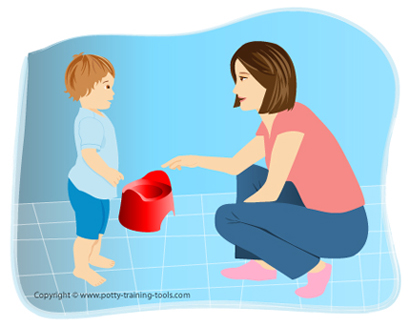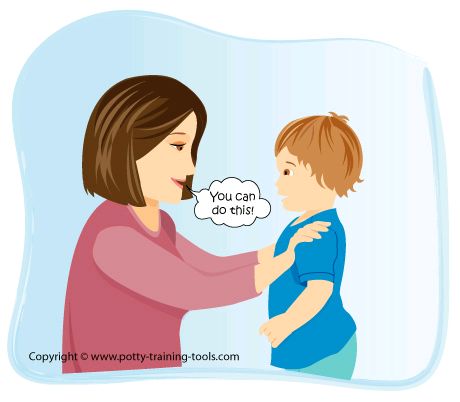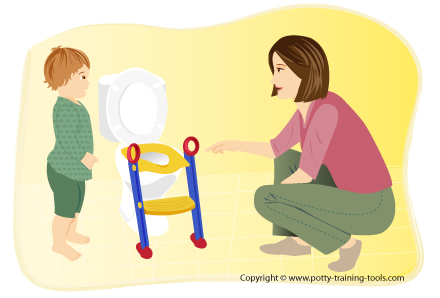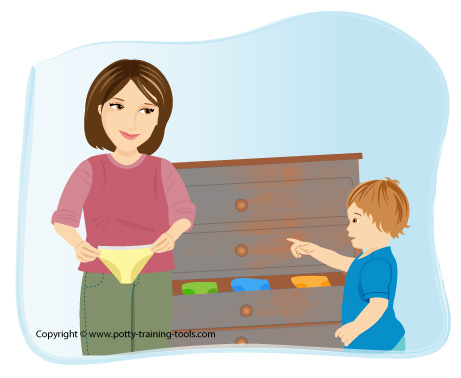Preparing my child
and setting expectations
before
starting potty training
Setting expectations: What does it mean?
From my point of view, setting expectations with my child before starting potty training means that:
(1) My child knows what is going to happen: He knows what to expect from the process of toilet training.
(2) My child knows what my expectations from him are in the context of toilet training. This is not about RESULTS: It’s not to say that “I expect you to be potty trained in 3 days” or anything like that… NO.
My expectations concern his behavior: Simply, I expect him to “follow my lead”. It’s not a condition; he might decide he doesn’t want to cooperate. I can't control that.
But I do want to send a clear message that I’m leading this process. Not so much in words but more through my tone of voice and from the way I conduct myself. Ultimately, I want him to get that from my actions.
My assumption is that some level of dialog has to take place before I start potty training my child. The timing and the content of that dialog, depends on how I view my child's maturity.

What do I hope to gain by preparing my child and setting expectations?
-
I get the chance to motivate and create a positive context around toilet training (for example by saying “You’re going to start using the toilet from tomorrow, because you’re a big boy, and you’re capable”).
-
I allow my child to get friendly with the idea a few days ahead, by describing what’s going to happen, and when. [And we know children respond well to that.] The actual duration of “few days ahead” should fit the child’s age: the younger the child -- the shorter the preparation.
-
By preparing my child for toilet training I’m letting him know: we are doing this. We are not “trying it”. This is happening. With this “conversation”, I’m setting the tone for the whole toilet training process:
(1) How I want it to be: Structured, pleasant, firmly-led;
and
(2) My role in it as a parent: Empathic, loving, and -- the one in charge.

When to set expectations? (How long before starting)
The way I see it, setting expectations before starting potty training, isn’t a typical CONVERSATION that I can have with my child once and expect it to just “stick”.
It’s more of a continuous, repetitive, very concise and simple message that I want my child to “get”.
When do I start getting that message through?
It depends on age.
Young toddlers between 1.5 and 2 years of age (before the “terrible twos”), are assumingly more receptive to changes, so will not need much preparation before starting potty training. They are more likely to simply “go with it”.
Also, given that their time-perception is limited by age, saying something like “next week we are going to take off your diaper” would mean very little.
My second boy was around 2 years old when we potty-trained him, and it was good enough to state something like “we’re going to take the diaper off and start using the toilet” -- about 2 or 3 times during the day before we actually started.
On the other hand, if my child is 3 years old or older than that, he will need and deserve a little more preparation before starting potty training: He’d spent longer time in diapers and gotten very comfortable there. I have to respect that.
By “more preparation” I don’t mean waiting until he agrees or wants to potty train, but I do want to allow him some space to understand that THIS IS GOING TO HAPPEN.
Telling my child WHEN we are going to start potty training
Personally, for a child around 2.5-3 years old I would give a few days notice, and I would make it clear and visible to him during those few days that:
(1) we are GOING to start potty training, and
(2) WHEN we are going to start it. Not a vague-When like “soon” or “pretty soon”, but exactly WHEN.
How?
He doesn’t speak “calendar language”, but there are ways:
I may try to locate it per a specific event that he can relate to. For example: “you know that on Thursday we are visiting grandma… and on Friday, which is the day after Thursday, we are starting potty training”.
And I can keep him oriented to the target-day a few days in advance: “Do you know what day it is today? Today is …. And what’s tomorrow? And what comes after?” or something of that sort.
Another option that could work with a 2.5-3 year old: Draw a simple table visualizing the week before starting potty training, and mark the starting-day with colors or stickers.
I would then post this paper on the fridge or above his bed, and take a few minutes each evening to put an X over today’s square (together with my child) and remind him when “the big day” is.
How to prepare my child?
No discussions or long explanations. Short, simple, clear message -- is the way to go, and I want to convey that message more through my actions, less through my words.
Basically, I would come up with some sort of a “winning phrase” and then find a suitable time to repeat that to my child every day, during several days before starting potty training. A suitable time could be while getting him dressed in the morning, or any other setting where I have his attention and he’s rather alert.
I may use motivational phrases like: “You’re a big boy”, “You’re grown up now”, “You can do this!”…
If there is an older sibling or cousin in the picture that my child looks up to, I may point it out as a positive context for him (“You will learn to poop in the toilet just like <…> does!). Probably should be careful in how I play that card, because I don’t want to give him a sense of competition.
But eventually, and as we approach the date of starting potty training, the message needs to be very clear: “Tomorrow we are taking off your diaper, and you will start using the potty/toilet. (Period)”.

Finally: What “message” do I want to send?
When I think of what message I want to send my child when preparing for toilet training, I’m thinking of the entire process, and the manner in which I want to conduct it.
Is it going to reflect my “parenting voice”?
What do I want it to sound (and look) like?
For me, these would be the key points / guidelines:
-
I’m the one leading the process and responsible for my child’s potty training
-
I want to conduct potty training with tremendous love and empathy towards my child, yet -- firmly.
-
I trust that my child is capable of this, and will succeed in potty training with my guidance.
-
Once the diaper comes off, that’s it. No more diapers during the day.
Having these guidelines in my mind (or written on sticky-note, posted somewhere -- for moral support) can help establish that confident state-of-mind that I want to be in when I’m potty training my child.
I want that to be reflected in my tone of voice, and in my actions, when I talk to my child about potty training and while conducting it. (I’m not going to actually say to my child “Listen, I’m leading the process”…).

To my child, I might say something like (not word-by-word, but the “spirit” of it):
-
We are going to take off the diapers, and you will be wearing a big boy’s underpants.
-
You are going to learn peeing and pooping in the toilet, because you’re a big boy now.
-
I’m going to help you at first. We’ll have many potty breaks today. When I say it’s time, you’re going to take a break from your toys and go to the bathroom, to pee in the toilet.
If you’re not sure about the level of preparation that your child needs before starting potty training, you may want to consult a professional: maybe a Child Psychologist, or a Consultant for toddlers’ behavior and education.
But ultimately, what (I believe) carries the most weight is your own preparation, and how you conduct the toilet training.
Return from Preparing my child before starting potty training to
How to Start Potty Training
Return from Preparing my child before starting potty training to
Potty Training Tools Home Page